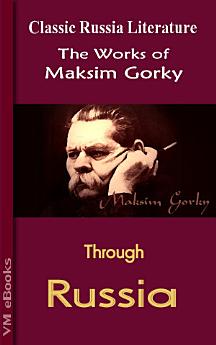Through Russia: Russian Literature
Információk az e-könyvről
THE BIRTH OF A MAN
The year was the year '92—the year of leanness—the scene a spot between Sukhum and Otchenchiri, on the river Kodor, a spot so near to the sea that amid the joyous babble of a sparkling rivulet the ocean's deep-voiced thunder was plainly distinguishable.
Also, the season being autumn, leaves of wild laurel were glistening and gyrating on the white foam of the Kodor like a quantity of mercurial salmon fry. And as I sat on some rocks overlooking the river there occurred to me the thought that, as likely as not, the cause of the gulls' and cormorants' fretful cries where the surf lay moaning behind a belt of trees to the right was that, like myself, they kept mistaking the leaves for fish, and as often finding themselves disappointed.
Over my head hung chestnut trees decked with gold; at my feet lay a mass of chestnut leaves which resembled the amputated palms of human hands; on the opposite bank, where there waved, tanglewise, the stripped branches of a hornbeam, an orange-tinted woodpecker was darting to and fro, as though caught in the mesh of foliage, and, in company with a troupe of nimble titmice and blue tree-creepers (visitors from the far-distant North), tapping the bark of the stem with a black beak, and hunting for insects.
To the left, the tops of the mountains hung fringed with dense, fleecy clouds of the kind which presages rain; and these clouds were sending their shadows gliding over slopes green and overgrown with boxwood and that peculiar species of hollow beech-stump which once came near to effecting the downfall of Pompey's host, through depriving his iron-built legions of the use of their legs as they revelled in the intoxicating sweetness of the "mead" or honey which wild bees make from the blossoms of the laurel and the azalea, and travellers still gather from those hollow stems to knead into lavashi or thin cakes of millet flour.
Értékelések és vélemények
A szerzőről
Alexei Maximovich Peshkov (28 March 1868 – 18 June 1936), primarily known as Maxim (Maksim) Gorky , was a Russian and Soviet writer, a founder of the socialist realism literary method and a political activist. Around fifteen years before success as a writer, he frequently changed jobs and roamed across the Russian Empire; these experiences would later influence his writing. Gorky's most famous works were The Lower Depths (1902), Twenty-six Men and a Girl, The Song of the Stormy Petrel, The Mother, Summerfolk and Children of the Sun. He had an association with fellow Russian writers Leo Tolstoy and Anton Chekhov; Gorky would later write his memoirs on both of them.
Gorky was active with the emerging Marxist social-democratic movement. He publicly opposed the Tsarist regime, and for a time closely associated himself with Vladimir Lenin and Alexander Bogdanov's Bolshevik wing of the party. For a significant part of his life, he was exiled from Russia and later the Soviet Union. In 1932, he returned to Russia on Joseph Stalin's personal invitation and died in June 1936.









